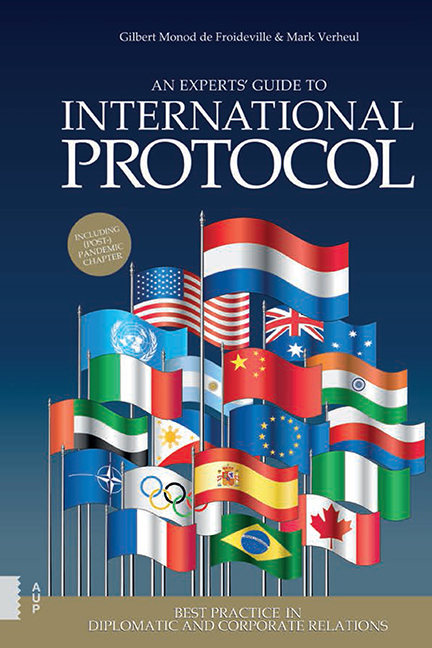Book contents
- Frontmatter
- Contents
- Preface to the original edition by His Royal Highness Prince Carlos de Bourbon de Parme
- Prologue
- Acknowledgements
- 1 International Protocol
- 2 Precedence
- 3 Seating Arrangements and Order of Processions
- 4 Flag Protocol
- 5 Invitations and Dress Codes
- 6 Gifts and Honours
- 7 Ceremonies
- 8 The Protocol Officer
- 9 Guest and Host
- 10 Protocol and Stakeholder Engagement During and after the COVID-19 Pandemic
- Authors’ Biographies
- Bibliography
- Websites
- Illustrations and Photographs
- Index
7 - Ceremonies
Published online by Cambridge University Press: 27 May 2021
- Frontmatter
- Contents
- Preface to the original edition by His Royal Highness Prince Carlos de Bourbon de Parme
- Prologue
- Acknowledgements
- 1 International Protocol
- 2 Precedence
- 3 Seating Arrangements and Order of Processions
- 4 Flag Protocol
- 5 Invitations and Dress Codes
- 6 Gifts and Honours
- 7 Ceremonies
- 8 The Protocol Officer
- 9 Guest and Host
- 10 Protocol and Stakeholder Engagement During and after the COVID-19 Pandemic
- Authors’ Biographies
- Bibliography
- Websites
- Illustrations and Photographs
- Index
Summary
Introduction
Ceremonies are an integral part of our lives. We make use of them every day, be it in our personal lives, such as at a wedding or a baptism, or in the professional sphere. Sometimes, ceremonies are used for one-off events, but they are more often used for recurring events as a part of government protocol, religious or cultural events, whereby the rituals connected with them often form the basis of ceremonies.
Many of these rituals are based on age-old traditions that have their origins in culture, religion, and the practices of ethnic groups and native populations who have played an important role in developing these cultures and religions.
In many cultures and belief systems, ceremonies take an important place as an expression of belief in a church, mosque, or temple where important personal events are marked by ceremonies, such as birth, marriage, death, and prayer. Religions often have ceremonies specific to their beliefs – in the Catholic Church, for example, specific ceremonies include baptism and confirmation, in Judaism, the bar mitzvah and bat mitzvah, and in Islam ceremonies are centred around belief and one's personal connection with God.
Besides religion, the armed forces have contributed to many kinds of ceremonies, still performed today, such as the change of command, military funerals, the laying of wreaths, arrival and departure ceremonies, and swearing-in, inauguration and decoration ceremonies.
A ceremony can be centred on one individual person and create an unforgettable moment, or become a fundamental part of national identity, such as the raising of a flag, the playing of the national anthem, a national remembrance day, the opening of parliament, the presentation of royal honours, etc.
Meaning of a Ceremony
When discussing ceremonies, it is common to associate the concept with solemn functions, commemorations, rituals, traditions and etiquette, which are often tied to memorable occasions and military protocol.
However, we need to define exactly what a ceremony is. One could say that a ceremony is an act, or series of acts, with a symbolic character, often prescribed by law, ritual, religion, custom, or authority, creating a memorable moment.
- Type
- Chapter
- Information
- An Experts' Guide to International ProtocolBest Practices in Diplomatic and Corporate Relations, pp. 183 - 224Publisher: Amsterdam University PressPrint publication year: 2021



